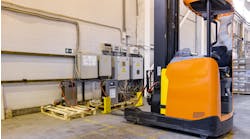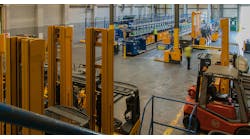Christmas-Testing KB’s eToys Purchase
As you read this, KB Toys has probably determined whether its purchase of eToys’ assets was a good investment. When eToys, the online toy retailer, filed for bank-ruptcy early this year, KB purchased the valiant but failed venture’s intellectual property and its Web site. By doing so, KB immediately doubled its existing Internet business. But the company had to act quickly if it was going to make that invest-ment work for them by Christmas 2001.
“When we bought the brand we did not have the capacity to support this year’s Christmas in our existing net-work,” says Bob Hassen, vice president of distribution and logistics, KB Toys. “We had a 300,000-square-foot facility in Danville, Kentucky, which was responsible for KB Kids Internet fulfillment. So we had to do something.”
eToys’ Blairs, Virginia, distribution center offered the right amount of space and material handling infrastructure to handle KB’s extra volume for another couple Christmas seasons, Hassen projected.
“No other facility matched our needs like this one because it was designed specifically for a business like ours,” he adds.
Everything was right except for the supply chain execution [SCE] system. KB decided it needed the latest logistics capabilities, and the system eToys installed did not meet those requirements. In fact, eToys planned to replace it eventually.
KB worked with Manhattan Associates, as well as consultants from Kurt Salmon Associates, to install Manhattan’s PkMS. The system itself had stand-out features, but the clincher was Manhattan’s accepting the challenge of a 10-week project schedule.
“We had to get something in quick so we could learn how to use the system, then hire and train the people we needed,” says Hassen.
Manhattan’s project system group did the system specs and its technical group did the SCE
modifications.
“Our challenges on the modification side were the material handling equipment interfaces,” says Brad Whicker, manager of implementation services, Manhattan Associates. “We needed to map to the interfaces that existed for eToys.”
That equipment included conveyor supplied by Mathews, part of FKI Logistex, and two Beumer sortation systems, one for packing sortation of picking units and the other for shipping sortation of completed packages.
“We learned later that there were some changes that eToys didn’t document,” Whicker adds, “but we moved around those obstacles very quickly.”
KB started shipping out of its eToys distribution center on September 17. As this story goes to press, KB is still receiving new SKUs for Christmas delivery. The success of KB’s fast-track investment will soon be known.
Kevin Hume, director of consulting for e-SYNC International, says such speedy implementations aren’t for everyone. Hume is a veteran of the original eToys project, as well as the WebVan venture for selling groceries online.
“KB is an exception because many of the systems integration issues had already been identified from the past eToys experience,” Hume adds.
Although both eToys and WebVan eventually went bankrupt, Hume argues that from a distribution and logistics standpoint, both projects were a success.
“WebVan configured and deployed a highly automated green field distribution design and was open to the public within eight months,” Hume continues. “There was a tremendous integration effort to launch this highly complex facility with more than six miles of conveyor, and it was disappointing to see it go up for auction within two years of the initial launch.”
What’s his advice to companies trying to emulate the fast-track KB Toys project?
“You can have the best software product in the world that can deploy wonderfully, but it still has to integrate with a conveyor control system and a sortation system,” he answers. “Especially with a new facility, it’s wise to plan for additional deployment time to anticipate the evolution of operational requirements that may affect future integration efforts.”
Meanwhile, KB has plans in the works for next year. Its retail store network is served by a different SCE system. KB plans to talk with Manhattan early in 2002 to explore the possibilities of integrating the Internet side of its business with the retail store side.
KB also plans to consolidate its Danville, Kentucky, Internet fulfillment operation into the eToys site by the end of January. Hassen says this facility will be sufficient to handle all of KB’s Internet business through next Christmas, but by 2003 the company will probably need a second facility.
No doubt the KB team will have learned enough lessons by then to make Christmas merry for thousands more children.
—Tom Andel
More Stocking Stuffers
Books always make welcome gifts. Here are a couple you might have missed at your local book store. The Perfect Engine also carries the subtitle How To Win in the New Demand Economy by Building to Order with Fewer Resources. Based on principles developed by Anand Sharma and other members of TBM Consulting Group, Sharma and co-author Patricia E. Moody reveal how the path-breaking LeanSigma Transformation can create a manufacturing environment focused on continuous improvement and consistent measurements. The book is available from The Free Press, an imprint of Simon & Schuster, for $30. Visit simonandschuster.com.
Another new book of interest to those in manufacturing, also from The Free Press, is Let’s Fix It! Overcoming the Crises in Manufacturing, by Richard J. Schonberger. The author explores why nearly 75 percent of companies viewed as global leaders in manufacturing less than a decade ago, have slipped badly from peaks. His research covers more than 500 prominent companies. Schonberger reveals the culprits, such as why inventories are bulging, and how to correct the problems. Available for $28 also as an eBook.
ODVA Names New Director
The Open DeviceNet Vendor Association (ODVA), an independent organization that supports worldwide growth of DeviceNet and EtherNet/IP, has named Katherine Voss executive director. Voss formerly worked for GE Fanuc Automation.
Managers Making News
Dave Schopp was recently named president and CEO, ORBIS Corporation, a subsidiary of Menasha Corporation. Schopp will have overall responsibility for ORBIS Corporation. Jerry Hessel was named president, ORBIS-North America and will lead ORBIS North America operations.
At The Multitech Group, an engineering services company, Scott A. Nilssen was advanced to executive vice president in charge of technical services, and James J. McLafferty was promoted to executive vice president in charge of training and documentation.
Cascade Corporation has appointed Tony Spinelli vice president, OEM.
Martin McVicar, chief executive officer and founder of Combilift, has been selected as the Ernst & Young Entrepreneur of the Year 2001.
Harting Inc. has appointed Richard A. Mack general manager of the company’s electronic business unit.
At GI Plastek, a custom manufacturer of plastic products, Bob Zygulski has been named manager of the Wolfeboro, New Hampshire, plant; Darrell Hastings, vice president manufacturing; and Wayne Donahue, manager of the Newburyport, Massachusetts, plant.
Letters to the Editor
Mr. Andel,
I read your October 2001 editorial with dismay that you would belittle such a forward-thinking individual as Dr. Stephen Hawking. You may view the link between computers and the human brain as a moral or physical aberration; however, consider the many benefits that
humanity could realize from such a connection.
a. Presently, we spend 16-20 years of our life educating those who will have to work within our current TechnoEconomy. This is ~25% of the average lifetime. If we had the ability to download packets of information (coordinated with biological development), this time could be shortened to a few hours, improving the productive time an individual could use the knowledge they possess (quality of life improvements).
b. Furthermore, this knowledge could be more easily shared among all of humanity. If you believe that ‘war’ is the result of differential knowledge between groups, then consider how this could positively impact future conflicts.
c. All the points you raised about improving supply and distribution would be resolved with the Frankenstein connection you so strongly disapprove of. If humans could directly interact with computers; we could access supply and distribution information instantly and in real time; anticipating demand and producing only what is needed without waste!
d. With direct access to all of the information created by humanity; not only could everyone have full and complete understanding of our history, but we could be multi-talented. You could be an engineer, geologist, historian or even a philosopher (which you clearly are not).
You missed the point about Dr. Hawking’s remarks. He is simply philosophizing about how humanity can progress to a new, future level of existence; while simultaneously dealing with the multitude of problems we currently face.
Regards,
Fred Fly
Mr. Fly:
Thank you for your passionate defense of Dr. hawking. I’m sorry you took it as an attack on his philosophy. That wasn’t my intent. My point was that real-world application of supply chain technology is so far behind the state of the art that we need to start looking at what we can realistically accomplish with what we have before we can successfully harness the kind of powerful technology Dr. Hawking foresees. We humans have a tendency to misuse technology before we get the hand of it, thus endangering or at least delaying the realization of its promise. We have only to look at the ERP disasters of recent years as an example.
It would be great if logistics professionals could establish a direct link to the consumer’s brain and get a reliable read on demand. But before we get there, we’d better master the basics first. And we haven’t. That’s why I made the allusion to Frankenstein. Misapplied science is dangerous. Just look at the danger we face because Osama bin Laden has the money to misappropriate and misapply the fruits of scientific R&D. If we try to follow Hawking’s advice before appreciating and perfecting the basics, we could have several monsters on our hands – one of them coming from the logistics laboratory. Maybe I shouldn’t have given the creature Hawking’s name. Let’s just call him “Human.”
Tom Andel, chief editor
Send your letters to [email protected]. Include your e-mail address. If e-mailing, mark the subject line “Letter to the Editor.”
Major Pallet Manufacturer Formed
PalletOne Inc. has completed the purchase of 12 pallet manufacturing facilities in Florida, Georgia, Indiana, Louisiana, Maine, North Carolina, Texas and Wisconsin. The completion of the purchase marks the founding of the company, making it the largest pallet manufacturer in the United States, according to a company spokesperson. Terms of the deal were not disclosed. The businesses were purchased as part of a divestiture by IFCO Systems, formerly known as PalEx.
Jim Griffin, IFCO Systems North America president, says, “The divestiture of the pallet manufacturing operation is consistent with our strategy to focus on our core business of reusable systems.”
Hy-Tek Reorganizes, Expands
Hy-Tek Material Handling Inc., winner of the Material Handling Management Valu


